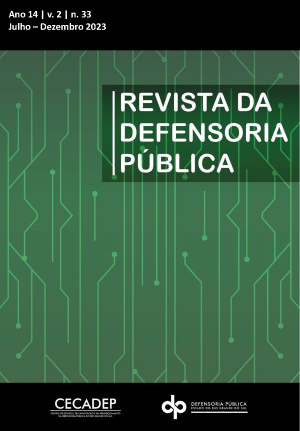Personal search without a judicial warrant
just cause, structural racism and the Public Defender’s role in the promotion of human rights
Keywords:
personal search, structural racism, human rightsAbstract
In April 2022, the 6th Courtoom of the Superior Court of Justice, when deciding the Appeal in Habeas Corpus n.º 158.580/BA, established an important jurisprudential understanding about the personal search without a judicial warrant, provided for in the article 244 of the Code of Criminal Procedure, so that any other different interpretations were undoubtedly overcome. The decision asserted the need for the existence of well-founded – and not mere – suspicion in order to proceed with the measure, necessarily related to the possibility of possession of objects that constitute the corps delicti of the crime. Still, the rapporteur's vote focused in detail on the issues that permeate police approaches and structural racism, proposing an important reflection. By themselves, personal searches violate fundamental rights to privacy, intimacy and even freedom, even though briefly. However, when they are not duly justified and are based on subjective and generic criteria, they serve as propagating instruments of structural racism, especially against young black people from the peripheries. Therefore, it is essential to stop and reject these behaviors. The analysis of this judgment is extremely important for operators of the Law in general, deserving special attention with regard to the work of the Public Defender, which has the constitutional mission of promoting human rights. Thus, as conclusion, considerations will be made about the agency's performance in combating not only illegal personal searches, but structural racism in general.
Downloads
References
ALMEIDA, Silvio Luiz de. O que é racismo estrutural? Belo Horizonte: Letramento, 2018.
BRASIL. [Constituição (1988)]. Constituição da República Federativa do Brasil de 1988. Brasília, DF: Presidência da República, 1988. Disponível em: http://www.planalto.gov.br/ccivil_03/Constituicao/Constituiçao.htm. Acesso em: 15 jan. 2023.
BRASIL. Decreto-Lei n. 3.689, de 3 de outubro de 1941. Código de Processo Penal. Brasília, DF: Presidência da República, 1941. Disponível em: https://www.planalto.gov.br/ccivil_03/decreto-lei/del3689compilado.htm. Acesso em: 15 jan. 2023.
BRASIL. Lei Complementar n. 80, de 12 de janeiro de 1994. Organiza a Defensoria Pública da União, do Distrito Federal e dos Territórios e prescreve normas gerais para sua organização nos Estados, e dá outras providências. Brasília, DF: Presidência da República, 1994. Disponível em: https://www.planalto.gov.br/ccivil_03/leis/lcp/lcp80.htm. Acesso em: 15 jan. 2023.
BRASIL. Superior Tribunal de Justiça (6ª Turma). Recurso em Habeas Corpus n. 158.580/BA. Tráfico de drogas. Busca pessoal. Ausência de fundada suspeita. Alegação vaga de “atitude suspeita”. Insuficiência. Ilicitude da prova obtida. Trancamento do processo. Recurso provido. Recorrente: Mateus Soares Rocha. Recorrido: Ministério Público do Estado da Bahia. Relator: Ministro Rogério Schietti Cruz, julgado em 19 de abril de 2022, DJe 25 de abril de 2022. Disponível em: https://www.stj.jus.br/sites/portalp/SiteAssets/documentos/noticias/RHC%20158580%20Ministro%20Rogerio%20Schietti%20Cruz.pdf. Acesso em: 15 jan. 2023.
CARNEIRO, Robyson Danilo. Abordagem policial: o exercício do controle social à luz dos direitos humanos. Curitiba: Juruá, 2022.
CASARA, Rubens R. R. Mitologia processual penal. São Paulo: Saraiva, 2015.
CORTE INTERAMERICANA DE DERECHOS HUMANOS. Caso Acosta Martinez y otros vs. Argentina. Buenos Aires: CIDH, 2020. Disponível em: https://www.corteidh.or.cr/docs/casos/articulos/seriec_410_esp.pdf. Acesso em: 02 abr. 2023.
DAVIS, Angela. Mulheres, raça e classe. São Paulo: Boitempo, 2016.
FOUCAULT, Michel. Vigiar e punir: nascimento da prisão. 42. ed. Petrópolis: Editora Vozes, 2014.
GRECO FILHO, Vicente. Manual do processo penal. 12. ed. Florianópolis: Tirant lo Blanch, 2019.
KENDI, Ibram X. Como ser antirrascista. Rio de Janeiro: Alta Cult, 2020.
MATA, Jéssica da. A Política do Enquadro. São Paulo: RT, 2021.
NUCCI, Guilherme de Souza. Manual de processo penal e execução penal. 11. ed. São Paulo: Gen/Forense, 2014.
REALE JÚNIOR, Miguel. Novos rumos do sistema criminal. Rio de Janeiro: Forense, 2015.
RIBEIRO, Djamila. Pequeno Manual Antirracista. São Paulo: Companhia das Letras, 2019.
ROSA, Alexandre Morais da. Guia do Processo Penal Estratégico: de acordo com a Teoria dos Jogos. Florianópolis: Emais, 2021.
Downloads
Published
How to Cite
Issue
Section
License
Copyright (c) 2021 Revista da Defensoria Pública do Estado do Rio Grande do Sul

This work is licensed under a Creative Commons Attribution-NonCommercial 4.0 International License.

Esta obra está licenciada com uma Licença Creative Commons Atribuição-NãoComercial 4.0 Internacional.
Qualquer usuário tem o direito de:
- Compartilhar — copiar e redistribuir o material em qualquer suporte ou formato
- Adaptar — remixar, transformar, e criar a partir do material
De acordo com os termos seguintes:
- Atribuição — Você deve dar o crédito apropriado, prover um link para a licença e indicar se mudanças foram feitas. Você deve fazê-lo em qualquer circunstância razoável, mas de nenhuma maneira que sugira que o licenciante apoia você ou o seu uso.
- Não-Comercial — Você não pode usar o material para fins comerciais.
- Sem restrições adicionais — Você não pode aplicar termos jurídicos ou medidas de caráter tecnológico que restrinjam legalmente outros de fazerem algo que a licença permita.












